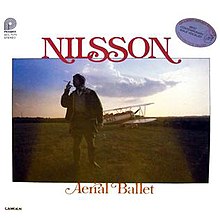Aerial Ballet
| Aerial Ballet | ||||
|---|---|---|---|---|
 |
||||
| Studio album by Nilsson | ||||
| Released | July 1968 | |||
| Recorded | Late 1967–early 1968 | |||
| Genre | Pop | |||
| Length | 25:15 | |||
| Label | RCA Victor | |||
| Producer | Rick Jarrard | |||
| Nilsson chronology | ||||
|
||||
| Singles from Aerial Ballet | ||||
|
||||
| 1980 Pickwick reissue cover | ||||
 |
||||
| Professional ratings | |
|---|---|
| Review scores | |
| Source | Rating |
| AllMusic | |
| The Essential Rock Discography | 6/10 |
| Rolling Stone | (mixed) |
Aerial Ballet is the third album by Harry Nilsson released in 1968.
Aerial Ballet was Nilsson's second album for RCA Victor, and was titled after the highwire circus act of his grandparents. It consists almost entirely of songs written by him, including "One", which later became a Number Five hit for Three Dog Night. (The song's opening line, "One is the loneliest number", is a common phrase to this day.) The title of the album has been given by Joey Kramer as the inspiration for Aerosmith's name and wings motif.
The most familiar track from Aerial Ballet is its one cover song, Fred Neil's "Everybody's Talkin'". It was released as a single in North America in 1968, and reached the top forty in Canada—but initially flopped in the US. However, the song was subsequently selected for use in the Oscar-winning film Midnight Cowboy and became one of Nilsson's biggest hits as a performer, hitting the US top ten in 1969. Another song, "Little Cowboy", later featured in The Courtship of Eddie's Father, was written by Nilsson's mother.
The original opening number for Aerial Ballet was "Daddy's Song", but this track was removed (apparently without Nilsson's awareness) after the first copies were issued, because The Monkees had recorded a cover version to be featured in their film Head, and had paid $35,000 for exclusive rights to the song. The CD reissue restores "Daddy's Song" (with the Monkees' contract long expired) to its rightful place in the lineup.
When Nilsson visited the Beatles in London during 1968, John Lennon played Nilsson "Revolution" and selections from the (then-upcoming) 'White Album', and Nilsson in turn played to Lennon (who had spent thirty-six hours listening to Nilsson's previous album, Pandemonium Shadow Show) a demo cut of this record.
...
Wikipedia
